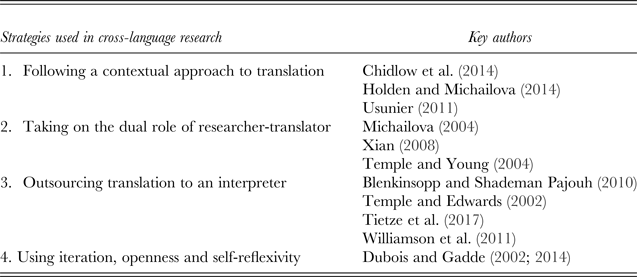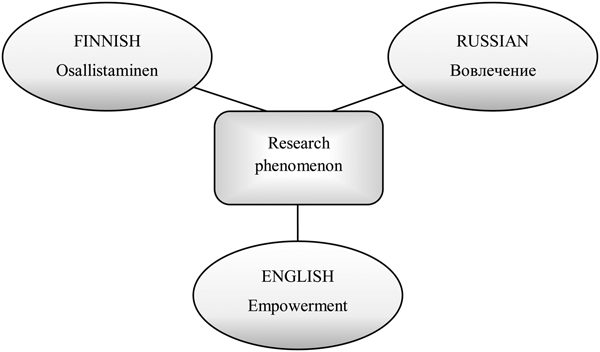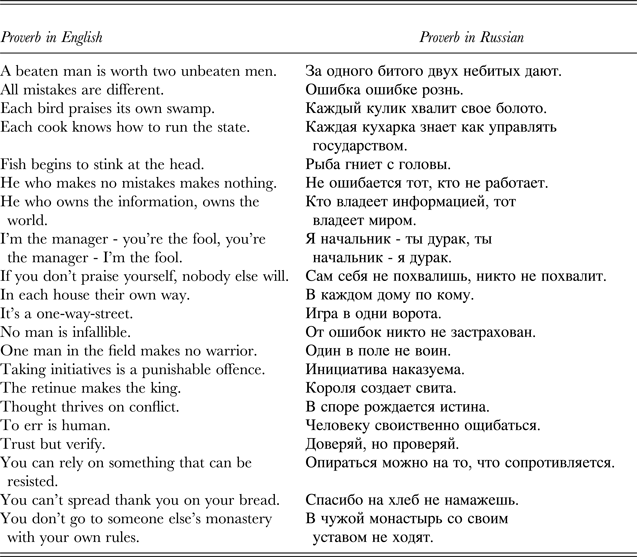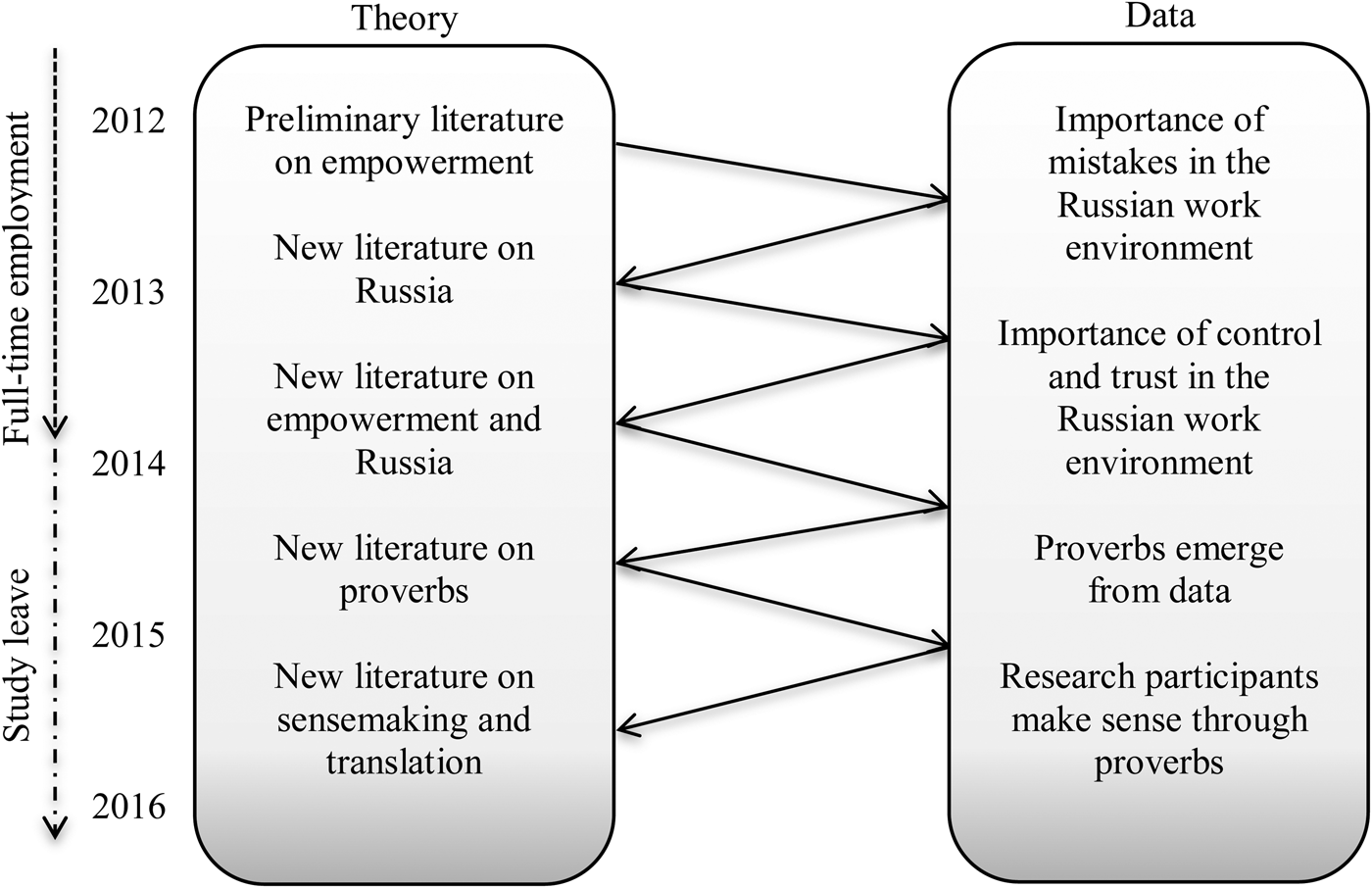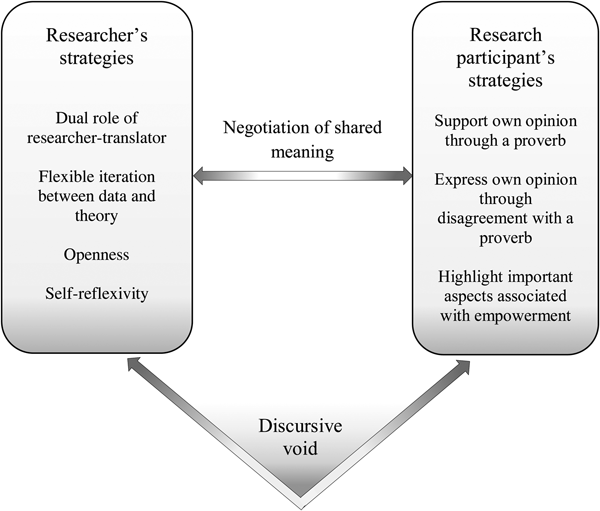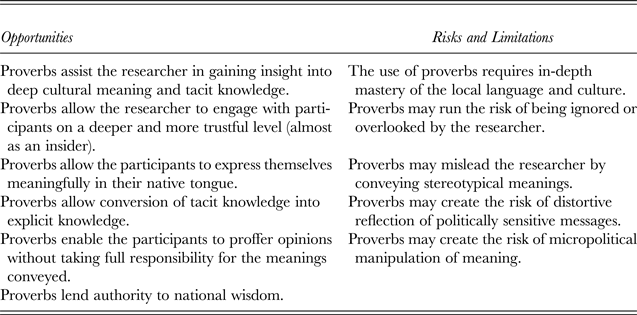INTRODUCTION
Scholars who work in emerging market contexts often conduct cross-language research. A specific challenge associated with research in these markets is the existence of so-called ‘discursive voids’ (Tietze, Tansley, & Helienek, Reference Tietze, Tansley and Helienek2017: 152), or ‘lexical and conceptual voids’ (Holden, Kuznetsova, & Fink, Reference Holden, Kuznetsova, Fink and Tietze2008: 121). These terms refer to the absence of Western business and management discourse in the local languages of post-communist emerging markets (Holden et al., Reference Holden2008; Kuznetsov & Kuznetsova, Reference Kuznetsov and Kuznetsova2014; Tietze et al., Reference Tietze, Tansley and Helienek2017). Kuznetsov and Kuznetsova (Reference Kuznetsov and Kuznetsova2014: 583) even describe the situation as a ‘discursive hazard’; Western companies operating in emerging markets experience gaps between the source and target languages. These discursive voids provide opportunities to influence and shape sensemaking. The need to establish shared meaning regarding ‘unsayables’ may even invite micro-political manipulation of meaning (Piekkari & Tietze, Reference Piekkari, Tietze, Becker-Ritterspach, Blazejewski, Dörrenbächer and Geppert2016).
In the present article, we explore the strategies through which both the research participants and the researcher negotiate shared meaning when confronting a discursive void in an emerging market context. Specifically, we ask the following research questions: What discursive resources do research participants use when there is no word for the phenomenon under study? and How do researchers negotiate shared meaning regarding the phenomena with the research participants when facing a discursive void? Russian subsidiaries of a Finland-based multinational corporation (MNC) that attempted to introduce employee empowerment as a core value in Russia provide the context for our study. Power (and its associated terms) is a challenging topic to discuss in the organizations of any culture because it generates ambivalent attitudes (Pfeffer, Reference Pfeffer1992). Our research represents an extreme case, because there is no word for employee empowerment in either Finnish or Russian, which were the languages used in fieldwork. Methodological problems often signal conceptual challenges, as was the case in our study. Even though Russia has developed since the collapse of the Soviet Union in 1991 into a major emerging market economy, the transition has been and continues to be influenced by the legacy of the Soviet era. Hence there are no equivalents for many Western management concepts and practices in Russian (Holden et al., Reference Holden2008).
The literature on qualitative cross-language research is only beginning to develop as language issues receive growing attention in management and international business research more generally (Beeler, Cohen, de Vecchi, Kassis-Henderson, & Lecomte, Reference Beeler, Cohen, de Vecchi, Kassis-Henderson and Lecomte2017; Brannen, Piekkari, & Tietze, Reference Brannen, Piekkari and Tietze2014; Piekkari & Tietze, Reference Piekkari and Tietze2011; Piekkari & Zander, Reference Piekkari and Zander2005). The few studies that investigate the role of language have offered many useful strategies for negotiating and establishing shared meaning. For example, researchers should draw on their own language skills and those of the research participants in qualitative interviewing (Macdonald & Hellgren, Reference Macdonald, Hellgren, Marschan-Piekkari and Welch2004; Marschan-Piekkari & Reis, Reference Marschan-Piekkari, Reis, Marschan-Piekkari and Welch2004; Welch & Piekkari, Reference Welch and Piekkari2006). They may take on the role of a translator in the field (Xian, Reference Xian2008), or turn to external interpreters (Temple & Edwards, Reference Temple and Edwards2002; Williamson et al., Reference Williamson, Choi, Charchuk, Rempel, Pitre, Breitkreuz and Kushner2011). A variety of approaches to translation dilemmas in qualitative and quantitative cross-language research have also been offered (Chidlow, Plakoyiannaki, & Welch, Reference Chidlow, Plakoyiannaki and Welch2014; Holden & Michailova, Reference Holden and Michailova2014; Temple & Young, Reference Temple and Young2004; Usunier, Reference Usunier2011). However, most of these studies tend to approach language issues primarily from the viewpoint of the researcher rather than that of the research participant, and they treat language differences as a challenge rather than an opportunity. In addition, most language research has been conducted in developed countries rather than in emerging markets (Tenzer, Terjesen, & Harzing, Reference Tenzer, Terjesen and Harzing2017).
This article makes two contributions to the growing discussion on qualitative cross-language research in general (Welch & Piekkari, Reference Welch and Piekkari2006; Xian, Reference Xian2008) and on qualitative research in emerging markets in particular (Michailova, Reference Michailova, Marschan-Piekkari and Welch2004; Michailova & Clark, Reference Michailova, Clark, Clark and Michailova2004). First, we identify the strategies used by both the researcher and the research participants to deal with language differences and negotiate shared meaning. Hence, we complement previous methodological literature, which has been dominated by a discussion of the researcher's perspective. In interpretive research, data are seen to be co-constructed with research participants (Alasuutari, Reference Alasuutari1996), and hence their take on negotiating shared meaning to bridge discursive voids becomes central. Second, our study of employee empowerment in Russia shows how the research participants used proverbs to make sense of empowerment. Proverbs are ‘traditional, pithy, often formulaic and/or figurative, fairly stable and generally recognizable linguistic units used to form a complete utterance, make a complete conversational contribution and/or to perform a speech act in a speech event’ (Norrick, Reference Norrick, Hristztov Gotthardt and Varga2014: 7). Compared with other discursive resources, such as metaphors and metonyms, proverbs are underexplored in qualitative organizational research, and therefore provide an original and innovative way to make sense of social phenomena and theorise about them.
The rest of the article is structured as follows. Our literature review integrates previous research on discursive voids and qualitative cross-language research that have to date remained largely disconnected (see Holden & Michailova, Reference Holden and Michailova2014; Tietze et al., Reference Tietze, Tansley and Helienek2017 for exceptions). We will then introduce our qualitative interview study of employee empowerment in Russia. In the next section, we detail the emergent strategies relied on by our research participants and the researcher to bridge the discursive void caused by the term employee empowerment. We conclude the article by discussing our contributions to qualitative cross-language research in emerging markets.
THEORETICAL BACKGROUND
Discursive Voids in Emerging Markets
For many decades, management concepts have travelled from Western market economies to emerging post-communist countries. Sahlin-Andersson and Engwall (Reference Sahlin-Andersson and Engwall2002: 292) even argue that ‘[c]oncepts of management have thus become the modern lingua franca. In order to be able to communicate in modern organizations and be able to handle upcoming problems, it is becoming increasingly important to know this language’. Scholars have revealed how Western management knowledge collides with the discursive environment in Central and Eastern Europe and with meaning systems from the Soviet legacy (Holden & Michailova, Reference Holden and Michailova2014; Kuznetsov & Kuznetsova, Reference Kuznetsov and Kuznetsova2014; Tietze et al., Reference Tietze, Tansley and Helienek2017). In a study about bringing talent management to Slovakia, Tietze et al. (Reference Tietze, Tansley and Helienek2017: 152) introduce the notion of a discursive void. Due to the lack of a linguistic signification system, making sense of talent management is very challenging for Slovak employees. Tietze et al. (Reference Tietze, Tansley and Helienek2017) acknowledge the important role played by consultants who translate foreign words and render them culturally, historically, and linguistically meaningful in the local context, thereby filling the discursive void. In another study, Holden and Michailova (Reference Holden and Michailova2014: 915) discovered how the translation of knowledge management concepts into Russian resulted in ‘subliminal semantic mutations as a result of lack of equivalence, ambiguities and cultural interference’. Kuznetsov and Kuznetsova (Reference Kuznetsov and Kuznetsova2014: 593) add that in Russia, ‘[p]rofessional discourse has been constrained not just by linguistic limitations, but also by [the] conceptual incapacity of the language, reflecting lack of experience with the market economy’.
HRM represents a new functional area in Russia, which has imported Western terminology and vocabulary of human behaviour. Hence, terms such as coach, mentor, and empowerment are ‘virtually untranslatable’ in the Russian context (Holden et al., Reference Holden2008: 122); because they lack a corresponding meaning system in Russia and other post-communist countries. Empowerment originates from the US; its roots are in the human relations movement of the 1920s, when there was a shift in focus from technological to human aspects in management (Wilkinson, Reference Wilkinson1998). The term was initially used in disciplines such as religion, sociology, education, and social work to strengthen the power of under-represented minority groups. Management scholars appropriated it in the mid-1980s to refer to employee participation in decision-making and the subsequent increase in employees’ knowledge, information and resources. It was also used in connection with the perceived ownership of their work (Bartunek & Spreitzer, Reference Bartunek and Spreitzer2006).
Despite the popularity of the empowerment concept among scholars and practitioners, there is no established definition of the term. Empowerment has often been used interchangeably with ‘participation’ and ‘involvement’, although it differs from them in terms of the redistribution of power and decision-making authority. In its original meaning, to empower means to authorise or give power to someone in a subordinate position. Whereas neither involvement nor participation entails sharing of power or authority, empowerment means that employees have – at least to some degree – the power and authority to make and implement their own decisions (Psoinos & Smithson, Reference Psoinos and Smithson2002; Wilkinson, Reference Wilkinson1998). As mentioned earlier, the present study is set in Russia, where the meaning of employee empowerment is less established and familiar to research participants than in market economies. Thus, the researcher and the research participants need to address the resulting discursive void.
Strategies of Cross-Language Research
In this article, we define cross-language research as the use of more than one language in framing a study, collecting and analyzing data, and/or in publishing the findings. During the course of a study, researchers may collect data in a local language, make sense of the data set in a second language, and finally report and publish their findings in English for the broader academic audience. We adopt the position that the challenges and opportunities associated with cross-language research should be identified and acknowledged, because they ultimately shape the findings of the study (Temple & Young, Reference Temple and Young2004; Xian, Reference Xian2008).
Our review of cross-language research suggests that scholars have tended to view language differences as a problem (see Usunier, Reference Usunier2011 for an exception), and devised various strategies to cope with them. Language has also been conceptualized as an instrument for dealing with issues of translation and functional equivalence between meaning systems (Brannen & Mughan, Reference Brannen and Mughan2017). Compared with qualitative traditions, quantitative research is more explicit and articulate in its treatment of languages. In their review of best practices in cross-cultural methodologies, Schaffer and Riordan (Reference Schaffer and Riordan2003: 188) highlight how linguistic differences between cross-cultural samples ‘may affect the semantic equivalence of multiple versions of a research instrument’ and present challenges for researchers. They recommend strategies such as back-translation, providing only an English version of the survey instrument, avoiding figurative language, conducting pilot studies, and using bilingual and bicultural researchers in the development and validation of survey instruments. In their global study of practice adoption in US-based MNC subsidiaries, Kostova and Roth (Reference Kostova and Roth2002) were very sensitive to different languages and the varieties thereof. They developed five different versions of their survey instrument for the English-speaking world alone (e.g., Australia, Canada, the US, the UK, and Malaysia) in order to achieve equivalence in constructs and words. The review by Chidlow et al. (Reference Chidlow, Plakoyiannaki and Welch2014) of both qualitative and quantitative cross-language studies shows that qualitative researchers tended to be more often silent about translation decisions than their quantitative peers. This silence may be due to the lack of standardized procedures for dealing with multilingual data in qualitative research (Chidlow et al., Reference Chidlow, Plakoyiannaki and Welch2014).
In our review, we focused on research based on primary data collection and identified four strategies that researchers have used to deal with language differences: i) following a contextual approach to translation, ii) taking on the dual role of researcher-translator, iii) outsourcing translation to an interpreter, and iv) using iteration, openness and self-reflexivity in the course of the research process. These are summarized in Table 1.
Table 1. Key strategies and articles used in cross-language research
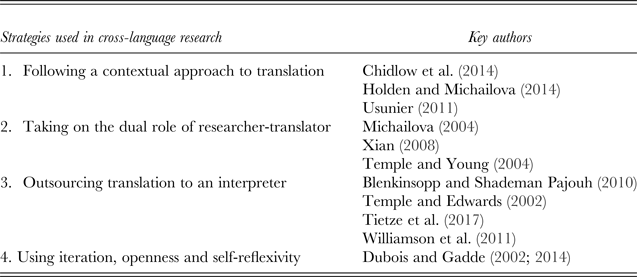
As Table 1 suggests, the first strategy is to follow a contextual approach to translation (Chidlow et al., Reference Chidlow, Plakoyiannaki and Welch2014). This strategy emanates from a paradigmatic shift in translation theory to a more contextualised and socio-culturally oriented conception of the translation process (Venuti, Reference Venuti1995). Translation becomes a form of intercultural interaction aiming at contextual consistency rather than lexical consistency between the source and the target languages (see also Xian, Reference Xian2008). Usunier (Reference Usunier2011) suggests adopting a cultural and political approach to translation rather than a mechanical one, so that language becomes a resource – a cultural informant – rather than a constraint. This challenges the approach of Chidlow and colleagues in their review of international business research, where most scholars consider translation a technical exercise that can and should be controlled by using suitable techniques such as back-translation. In our study, we followed a contextual approach to translation when analyzing proverbs that reflect the cultural, historical, and institutional characteristics of the context.
Taking on the dual role of researcher-translator, which ‘offers the researcher significant opportunities for close attention to cross cultural meanings and interpretations’ (Temple & Young, Reference Temple and Young2004: 168), is the second strategy presented in Table 1. This strategy draws on the researcher's mastery of the languages used in the field in order to capture the irony, humour, and idiomatic expressions of the respondents’ culture (Michailova, Reference Michailova, Marschan-Piekkari and Welch2004). Xian (Reference Xian2008) used this strategy when she relied on her own language skills to translate career narratives of Chinese women from Chinese to English. Despite being bilingual, she raises several linguistic, socio-cultural, and methodological problems that emerged during her experiences of data translation. In her confessional tale, she even questions her ability ‘to speak for the Chinese women in another language’ and do justice to them in her representation of their careers to Western audiences of academic journals (Xian, Reference Xian2008: 237). Xian argues that by taking on the role of translator, the researcher becomes an integral part of the knowledge production in cross-language research. This role is also bound to the socio-cultural positioning of the researcher, which affects the process and outcome of translation (Temple & Young, Reference Temple and Young2004). In our study the first author, who was fluent in the Russian language and culture, adopted the dual role of researcher-translator, which enabled her to consider the proverbs used by the research participants.
Our review suggests that outsourcing ‘the language problem’ to external interpreters is a third possible strategy for researchers with limited language skills and translation competence (Temple & Edwards, Reference Temple and Edwards2002; Williamson et al., Reference Williamson, Choi, Charchuk, Rempel, Pitre, Breitkreuz and Kushner2011). Blenkinsopp and Shademan Pajouh (Reference Blenkinsopp and Shademan Pajouh2010) explored how professional translators and interpreters in Iran dealt in English with untranslatable but culturally salient words such as the Farsi word ‘tarouf’ in the course of their day-to-day translation work. Blenkinsopp and Shademan Pajouh (Reference Blenkinsopp and Shademan Pajouh2010) found that avoidance was the most common strategy among these professionals. The interviewees ignored this word or ‘tried to translate it in a way which was as close as possible to the intended meaning whilst presenting it in ways which their clients would find recognisable’ based on their own culture (Blenkinsopp & Shademan Pajouh, Reference Blenkinsopp and Shademan Pajouh2010: 46). While their article does not intend to make a methodological contribution, it points to the potential strategies and tactics of dealing with untranslatable words in cross-language encounters. In a study by Hong, Snell, and Mak (Reference Hong, Snell and Mak2016), interviews with local respondents were conducted through a company translator who acted in effect as an external interpreter. Hofstede (Reference Hofstede1980) also acknowledges the important role of in-company personnel in administering and translating the massive survey that was used in his seminal work on culture. Interpreters are increasingly seen as active co-producers of data whose values, experiences, and concerns inform their interpretations (Temple & Edwards, Reference Temple and Edwards2002; Temple & Young, Reference Temple and Young2004). It is therefore important not only to provide interpreters with sufficient knowledge about the purpose of the study and their role in the study (Williamson et al., Reference Williamson, Choi, Charchuk, Rempel, Pitre, Breitkreuz and Kushner2011), but also to make them aware of how their own views on the issues being discussed will shape the data being collected. Temple and Edwards (Reference Temple and Edwards2002) emphasise including interpreters in discussions on reflexivity and context. In our study, we sought advice from professional interpreters, two of whom were company translators, when checking the accuracy of our translation of proverbs.
Advocating flexibility in research design is the fourth strategy for dealing with language differences discussed in Table 1. Researchers following this strategy allow research questions to co-evolve and change during the course of the study. They embrace the emergent and iterative nature of qualitative research as a strength and resource. In their influential article, Dubois and Gadde (Reference Dubois and Gadde2002: 559) argue for an abductive approach in which ‘the original framework is successively modified, partly as a result of unanticipated empirical findings, but also of theoretical insights gained during the process’. License to modify the research design is particularly relevant in emerging markets, where the researcher needs to be prepared for emergent phenomena not expected in predominant research contexts. Furthermore, in constructivist qualitative research, the researcher is encouraged to engage in (self-)reflexivity and acknowledge her role as an instrument in the research process, who alongside the research participants also influences data collection and analysis (Haynes, Reference Haynes, Gillian and Cassel2012). For example, as a dual researcher-translator, the researcher needs to be transparent about how her personal experiences and world views shape word choices (Temple, Reference Temple1997). In our study, flexibility and iteration played an important role as the researcher attempted to cope with the challenges encountered in the field and make sense of data, as will be explained later.
To conclude, our review of the methodological literature shows that issues of language differences and translation have primarily been discussed from the viewpoint of the researcher (or the translator/interpreter) rather than that of the research participants. We contribute to this literature by also including the perspective of the research participants and exploring how both the research participants and the researcher cope with language differences to address discursive voids in an emerging market. We purposefully use the term research participant instead of informant to denote that the interviewees had an active role in co-constructing meaning together with the researcher in our study.
Against this background we pose the following research questions: What discursive resources do research participants use when there is no word for the phenomenon under study? How do researchers negotiate shared meaning regarding the phenomena with the research participants when facing a discursive void?
A STUDY OF EMPLOYEE EMPOWERMENT IN RUSSIA
The methodological and conceptual insights stem from a study of empowerment in Russia. The research site is a Finnish MNC that has been in the Russian market for over fifty years. Since 1997, the company has established subsidiaries in six cities in Russia. These subsidiaries are either partial acquisitions or greenfield investments. As mentioned above, our empirical research revealed that there is no word for employee empowerment in either Russian or Finnish. Empowerment was, however, embedded in the Finnish parent company's values and leadership principles, which emphasised giving and taking responsibility, trust, and employee independence. The Finnish word ‘osallistaminen’ (participation), the English term ‘involvement’ and the Russian term ‘вовлечение’ (involvement), which were used in the three language versions of the company guidelines, offered a narrower view than the English concept ‘empowerment’, which is used in scholarly writings (see Figure 1).
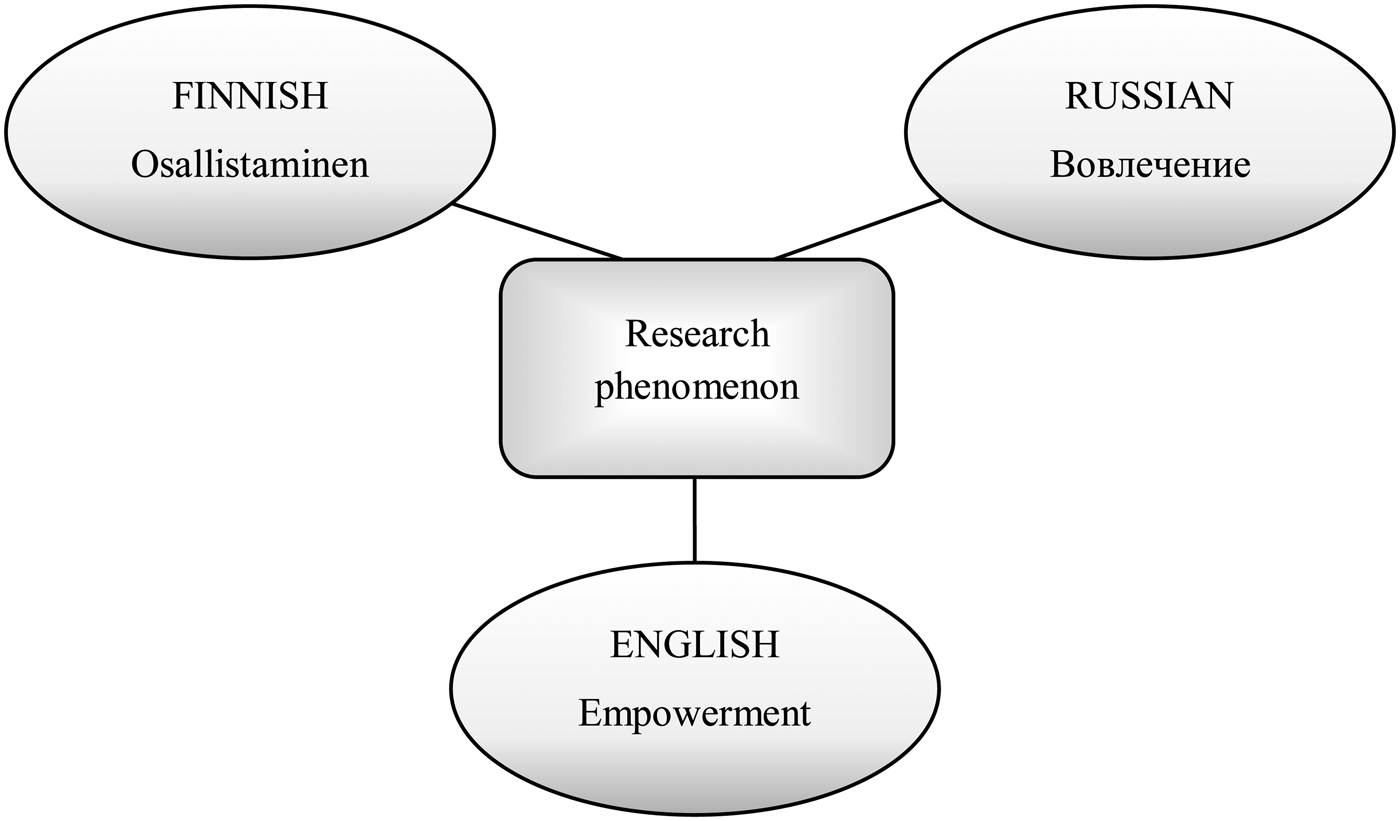
Figure 1. Empowerment in English and related concepts in Finnish and Russian
The first author of this article had a dual role in the field, as she was both a researcher and a manager helping the company to understand the challenges it faced when moving its core values and practices to the Russian operations. While the insider status of the first author assured access to rich data, her position also influenced the narratives of the research participants and called for particular sensitivity and reflexivity. We consider such a situation an inherent part of research projects in which a researcher studies her own organisation (see e.g., Alvesson, Reference Alvesson, Ybema, Yanow, Wells and Kamsteeg2009).
During and after her employment in this company, the first author conducted altogether 86 in-depth, semi-structured interviews with Russian managers and employees between May 2013 and April 2014. The interviewer's ability to speak Russian was of critical importance, as the majority of the research participants did not speak English. Also, familiarity with the participants made them feel comfortable and enabled rapport and a sense of connection. Her contextual sensitivity and particular interest in language and linguistic expressions also increased her openness to data.
The absence of a comparable concept raised methodological questions about how to discuss the research topic with the Russian research participants. Venuti (Reference Venuti1995) identifies two approaches to translation: a ‘domesticating’ approach, i.e. finding the closest match in the local language, or a ‘foreignizing’ approach, i.e., retaining the original word through transliteration in the form of Anglicisms. Each approach faced problems in this context. While domestication may have helped the Russian research participants to put the term into a familiar context, the meaning of the original Russian term may have been distorted. Similarly, incorporation of foreign words through a mix of Russian and English into the interview questions may have hampered understanding of the word by local research participants due to their limited foreign language skills, as was the case in our study. In order to overcome this, the first author used Russian only in the interviews and talked around empowering practices by using terms such as information sharing, participation in decision-making, and management control and monitoring. Hofstede (Reference Hofstede1980: 35) also notes that ‘[i]f equivalents of a concept in another language’ are missing, the desired meaning can still be conveyed but through the use of additional words.
In the course of the study we discovered the important role of proverbs. For researchers, proverbs are a linguistically challenging methodological tool. Special care needs to be taken when translating them because proverbs often contain archaic words or unusual word order. In our study, this issue was addressed by having external interpreters and a professional proof reader with an understanding of Russia and the Russian language. There was no need to translate the interview data in English for data analysis purposes, as the entire co-author team was fluent in Russian. Hence the entire data set was transcribed and analysed in Russian. Towards the end of the study, the first author translated the interview quotations from Russian to English and the other members of the co-author team reviewed the translation.
When analysing the data, the Russian proverbs were a resource to discover new meanings of empowerment in Russia. Previous research on Russian management has emphasised hierarchical organizational structures and authoritarian relationships between Russian managers and their subordinates (Fey, Reference Fey2008; Fey & Shekshnia, Reference Fey and Shekshnia2011; Michailova, Reference Michailova2002). Many of the proverbs that our research participants used spontaneously in the interviews such as ‘I'm the manager, you're the fool’ contradicted the Western view of empowerment and in this regard confirmed previous findings. However, we were surprised to learn that our research participants also used proverbs such as ‘One man in the field is no warrior’, and ‘Thought thrives on conflict’, which can be seen to highlight a participative leadership approach. Table 2 summarizes more than 20 proverbs used by the research participants in the interviews. It is worth noting that proverbs need to be understood in context. Hence, the link between the proverbs listed in Table 2 and empowerment may not be obvious from the proverbs alone. In the Findings section, we provide evidence of how proverbs enhanced our understanding of empowerment in particular situations in Russia.
Table 2. Proverbs used by the research participants
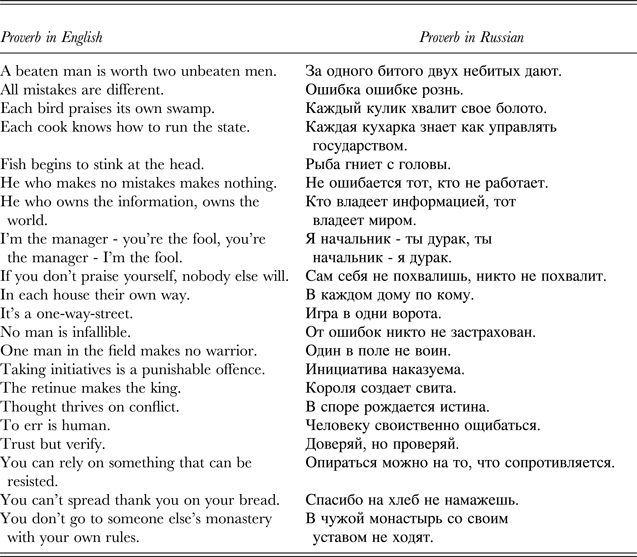
A closer reading of the proverbs revealed how managers constantly cared for and supported their subordinates, while simultaneously exercising relatively frequent and tight control, at least as seen from a Western perspective. Most of the Russian research participants, both managers and employees, interviewed for our study understood empowerment as the natural co-existence of high degrees of control and trust. Compared with Western writing on empowerment, we were able to offer a more nuanced meaning of this concept in the Russian context (see Table 2), which includes controversial approaches, both authoritative and participative, to empowerment. In the next section we first turn to the strategy of the research participants for making sense of a research phenomenon for which there is no equivalent word in their language and elaborate on their use of proverbs as a strategy. We then examine how an alert researcher can work with their responses to co-create meaning.
ADDRESSING THE DISCURSIVE VOID
Providing research participants with space to engage in sensemaking and describe their sensemaking processes to the researcher is a key research strategy for addressing discursive voids. Such openness is an inherent strength of qualitative research. In the following, we will first describe how the research participants filled the discursive void and thereafter turn to the researcher.
The Research Participants’ Strategy
When analysing the data, we initially noticed only a few proverbs used by the Russian research participants when discussing the meaning and practices of empowerment. Soon we realised, however, that the proverbs were more than just illustrations of the Russian worldview. They provided a means for the research participants to make sense of empowerment as a foreign management practice and explain their views. This was evident in the way they foregrounded the proverb with special voice shifts and marked it with framing devices like ‘in Russia we have this kind of proverb’. The use of proverbs in Russia has been associated with feelings of ‘intimacy and warmth’ (Holden, Cooper, & Carr, Reference Holden, Cooper and Carr1998: 186).
In our dataset, proverbs were used regardless of gender or age by approximately half of the research participants, who represented a variety of positions: top managers, middle managers and employees. This finding confirms the argument by Holden et al. (Reference Holden, Cooper and Carr1998: 186) that ‘it is not only less educated people who indulge in proverbs’ in Russia. It was noteworthy that talkative research participants often used proverbs during the interview, some of them even several. The theme of mistakes triggered the largest number of proverbs, such as ‘all mistakes are different’, which may indicate that mistakes play an important role in Russian society more generally. Otherwise there were no big differences in our data set in terms of how often each proverb was used by the research participants.
We distinguish between three different ways in which the research participants used proverbs in making sense of empowerment. Some of them used a proverb to support their own opinion or to contrast its meaning with their own opinion. Others used proverbs to emphasize an important element associated with empowerment. Here is how one employee uses a proverb to support her own opinion when describing her view on initiatives:
Researcher: Do you think that you can take the initiative?
Research participant: Well, as we say, ‘taking initiatives is a punishable offence’. If you take the initiative, then [you need to] implement your suggestion. But in principle, if there is a reasonable suggestion that can be implemented, of course you can take the initiative, but first of course discuss it with your manager.
The research participant starts her argument with the proverb and then explains its meaning to a foreign researcher. Initiatives may result in ‘punishment’, because one may end up implementing them. Another point emphasised by the research participant is the quality of the suggestion; only ‘reasonable’ ones are welcomed, the rest are punishable. It is the manager who determines what is reasonable, that is why all initiatives need to be cleared by management first. These views were confirmed by other research participants as well. For example, one top manager stated that ‘I expect suggestions, but within certain frameworks. I don't have time to listen to nonsense’. The attitudes towards suggestions reflected in the proverb can be seen to demonstrate an authoritative approach and lack of support for empowerment in Russia.
Another research participant, a middle manager, brings forward a more participative approach to empowerment, while also using a proverb to support her own opinion:
I am in contact every day with Alexander [the manager]. We have good, friendly relations, we try to solve all problems, I always ask his opinion, we always discuss [things] in the beginning: ‘thought thrives on conflict’. We can debate and argue; then we complete the task and come to the needed result more quickly by disputing and discussing.
‘Thought thrives on conflict’, the proverb used by the research participant, means that according to the literal Russian expression, an idea or truth arise from arguments and debates. This middle manager highlights how she is able to express her own opinion to her manager. The informal, even friendly relationship with her manager is well illustrated by her use of the manager's first name, which is not typical in a Russian work environment. Also, the willingness of the manager to listen to opposing views from employees is not often reported in studies regarding Russia, where managers should always appear more knowledgeable than their employees.
Some research participants used proverbs to highlight their own opinion by disagreeing with the proverb. They acknowledged the Russian way of thinking, but stressed that their own view was not aligned with such traditional thinking, as expressed by one top manager:
In Russia the tradition is naturally ‘I'm the manager, you're the fool’. This system works in Russia, but I don't support it. The percentage of [managers] using this kind of a system should be small; there's usually a need to discuss.
In this quotation the research participant uses the proverb to challenge the power hierarchy and imbalance between managers and their subordinates in Russia. The proverb provides a straight-forward way to draw on the ‘Russian tradition’, while at the same time taking distance from maintaining Russian power hierarchy. Typically, research participants representing this view had previously worked for Western companies and were therefore accustomed to Western values such as empowerment. Hence their understanding of empowerment was well aligned with Western views. The same top manager disagrees with yet another proverb:
As they say, ‘the fish begins to rot from the head’, but we have the opposite situation. If positive values and signals come from the top, then everything below will be good.
Although the proverb suggests that destruction starts with top management and then diffuses throughout the organisation, this top manager twisted its meaning. He emphasizes that positive things also start with the company management. By emphasizing the role of top management in comparison with other employee groups of the company, he also highlights the authoritative approach prevailing in Russian organizations.
Some research participants resorted to proverbs to signal important elements that they associated with empowerment. For example, the important role played by mistakes became evident only after we realized how frequently the research participants used proverbs that referred to them. The following two quotations by top managers show attitudes towards mistakes:
It depends on the character of the mistake. ‘One beaten man is worth two unbeaten men’ – a Russian proverb. It means that if the person making the mistake is guided and trained by this mistake, he is more valuable than a totally new person. I am more interested in how the person corrects the mistake, reflects on it, and learns from it. If the person doesn't do any of this, I can dismiss him.
‘All mistakes are different’. First, you need to talk about the mistake. Depending on the level of harmfulness for the company there can be different consequences, either tough decisions or soft advice. In general, I understand if a person makes mistakes. If the mistake concerns something new, that's normal. If there are many mistakes about something that is familiar, then your reaction should be more severe. There are different approaches to mistakes.
These extracts illustrate how proverbs not only provided the research participants with a way to explain their view, but also inspired them to discuss different aspects related to mistakes, such as their nature, frequency, and consequences. Proverbs also underscored the importance of analysing mistakes thoroughly and ensuring that the person had learned from them as well as the harshness of punishment in the Russian work environment. Hence proverbs provided a more nuanced view of the role of mistakes in impeding implementation of empowerment in the Russian context.
Finally, proverbs also alerted the researcher to similar themes in interviews in which the research participants did not directly employ or refer to a proverb but reflected on the same values and worldviews. A potential reason for not using proverbs could have been personal preferences and attitudes towards having a discussion in an interview setting. Some research participants preferred a more formal style of expression and used business language rather than a narrative style during the interview. Those situations, however, also supported and confirmed the findings illustrated by proverbs.
The Researcher's Strategy
The researcher adopted an iterative approach to the research process, which allowed for flexibility and openness in data collection and analysis. Iteration entails constant interplay between theory and empirical work. As mentioned earlier, since there is no word for empowerment in Russia, the researcher approached the topic of empowerment during the interviews by using related concepts, such as employee involvement and participation. It was therefore important to acquire some theoretical pre-understanding of empowerment prior to entering the field. Using Alasuutari's (Reference Alasuutari1996: 374) terminology, the first author, who conducted the interviews, was ‘theoretically informed’ about the ‘different options in approaching the phenomenon’ (see Figure 2).
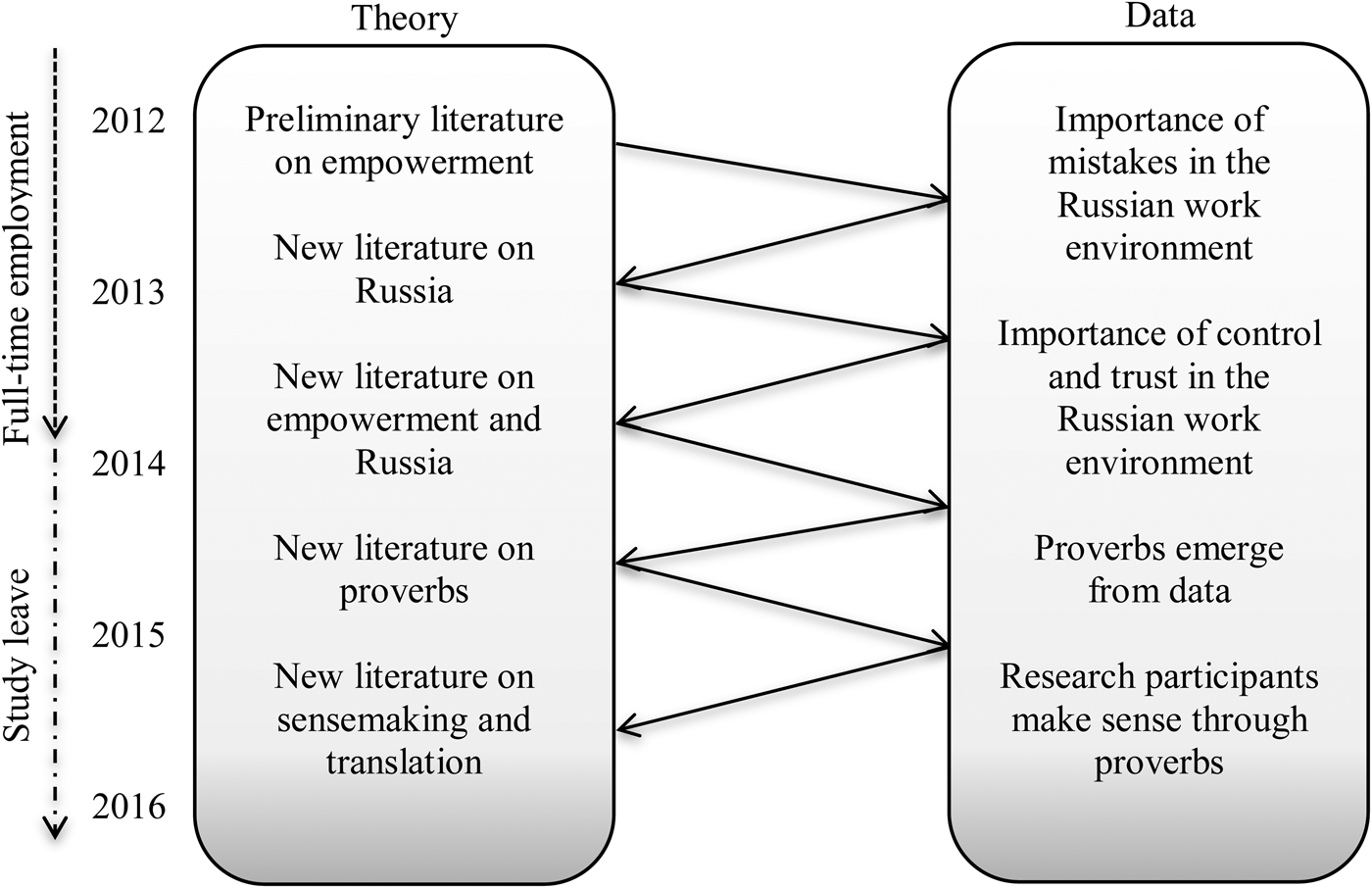
Figure 2. An iterative research process
During the interviews the first author posed questions about manager-subordinate relationships with a particular focus on mundane work practices, their meaning and underlying values. She asked research participants about meetings with their managers, topics of discussion in these meetings, decision-making power, and opportunities to have a say in their own work. The aim was to understand the extent to which managers were involved in the work of their subordinates and the use of empowering practices in this particular organization in Russia.
When conducting interviews, the first author noticed that mistakes played an important role in the accounts of her research participants and, in line with iterative approach, she turned to the literature to learn more about mistakes in the Russian environment. Similarly, during the interviews she realised that Russian and Western understandings of control and trust do not coincide. This led her to acquire more knowledge about this specific topic in the context of Russia. Figure 2 illustrates this iteration between theory and data in the present study.
The rich and varied use of proverbs by the research participants proved to be a great resource in data analysis. As Figure 2 illustrates, we therefore started to explore the literature on proverbs in order to understand their role in social interaction. The proverbs directed the data analysis phase towards those issues that were salient in the Russian context. These discursive resources guided our interpretation of the findings and gave us insight into which issues mattered in employee empowerment in Russia and why. For example, as shown in the previous section, particular proverbs revealed the importance of mistakes in the Russian working environment, which was a novel finding in the empowerment literature in general. Proverbs also enabled us to see the ambivalent nature of empowerment in Russia. Based on previous research, we expected to discover an absence of empowerment or at least opposite and contrasting views towards it. Our theoretical expectations were partly met, but we were surprised to uncover a caring attitude on the part of Russian managers towards their subordinates. Such co-existence of opposite views on empowerment had not been identified in previous literature. Thus, proverbs paved the way for novel theoretical insights about empowerment in the Russian context.
Finally, the dual role of the researcher as a researcher-translator proved essential in giving and making sense of the data. The experience and knowledge of the first author about Russia enabled her to use a contextualized approach to translation, focusing on ‘contextual’ consistency rather than ‘verbal’ [literal] consistency (Xian, Reference Xian2008: 235). The use of proverbs in analysing the data is a concrete example of contextual translation and knowledge production, where social and cultural meanings were constructed. By providing an explanation of and background to the proverbs used by the research participants in the data set, the first author acted as an intercultural communicator in relation to her audience and readership, emphasising the culturally dependent nature of meanings related to the research phenomenon (Xian, Reference Xian2008).
DISCUSSION
In this article we have studied how to cope with a ‘discursive void’ (Tietze et al., Reference Tietze, Tansley and Helienek2017: 152) in an emerging market context, Russia. Despite the absence of a comparable concept for empowerment in the Finnish and Russian languages, the phenomenon nevertheless existed in Russia and could be studied empirically. This discursive void encouraged both the research participants and the researcher to approach the topic in a sensitive, reflexive and open way. Our study showed how language differences provided an opportunity for gaining novel theoretical insight into empowerment, which was understood as an ambivalent concept simultaneously representing both authoritative and participative approaches.
We contribute to the methodological discussion on qualitative cross-language research and on qualitative research in emerging markets in two important ways. First, by integrating previously disconnected streams of literature on discursive voids and cross-language research (see, Holden & Michailova, Reference Holden and Michailova2014; Tietze, Reference Tietze, Tansley and Helienek2017 for exceptions), we shed light on the strategies used by both the research participants and the researcher when negotiating shared meaning in the context of emerging market.
When a Western researcher interviews another Western person, there is an implicit assumption of mutual understanding and thus, no particular strategies for negotiating shared meaning are necessary. However, when a Western researcher conducts fieldwork in emerging markets, this assumption does not hold anymore (Voldnes, Grønhaug, & Sogn-Grundvåg, Reference Voldnes, Grønhaug and Sogn-Grundvåg2014). In our study, the researcher played a dual role of researcher-translator (Xian, Reference Xian2008), used a contextual approach to translation (Chidlow et al., Reference Chidlow, Plakoyiannaki and Welch2014; Xian, Reference Xian2008), consulted interpreters in post-interview phase (Temple & Edwards, Reference Temple and Edwards2002), and adopted a flexible and iterative approach (Dubois & Cadde, Reference Dubois and Gadde2002, Reference Dubois and Gadde2014) in making sense of data as her main strategies. The research participants in turn resorted to proverbs when attempting to explain the local meaning of empowerment to the researcher and to build a feeling of understanding. They engaged in joint sensemaking and acted as co-producers of knowledge alongside the researcher. The use of a local language between the research participants and the researcher during interviews eliminated the need for relying on an external interpreter, whose role in knowledge production has been discussed and debated in previous research (e.g., Gawlewicz, Reference Gawlewicz2016; MacKenzie, Reference MacKenzie2016). Close interaction during interviews and an open atmosphere between the research participants and the researcher is important for encouraging participants representing various organizational levels to use rich language. However, the perspective of the research participant has received limited attention in the methodological literature, and we were therefore able to provide a valuable addition to this stream of literature.
Second, we identified proverbs as a discursive resource for making sense of and analysing the data. While there are various ways to deal with discursive voids, we offer the use of proverbs as one possible approach. To the best of our knowledge, proverbs have previously received limited attention in cross-language research or in organizational research more generally. Figure 3 summarises our research findings.
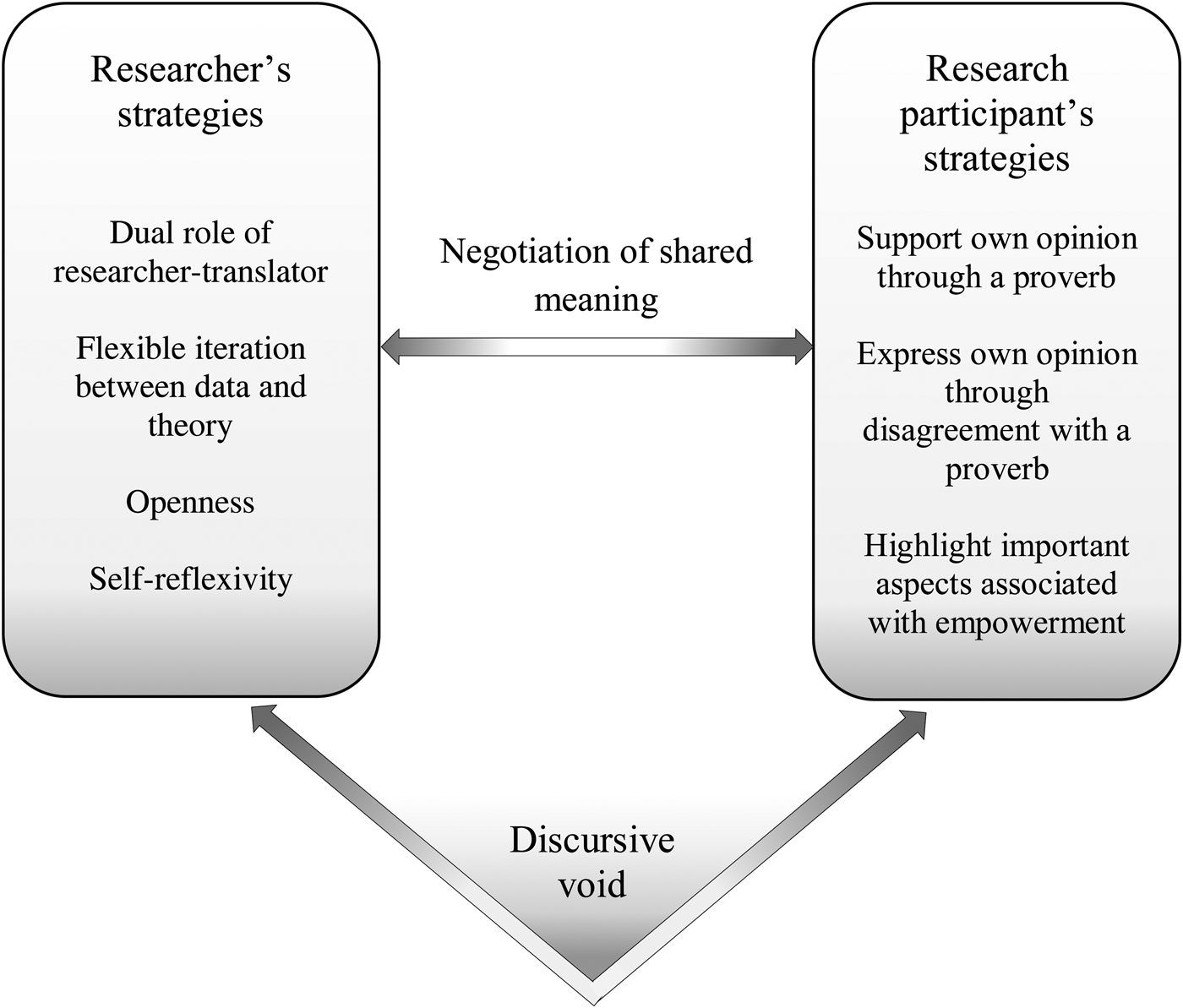
Figure 3. Addressing the discursive voids
The Russian language is particularly rich in proverbs. It has been said that every adult Russian language speaker knows more than 800 proverbs, proverbial expressions, popular literary quotations, and other forms of cliché (Permyakov, Reference Permyakov1989). Proverbs are used in speech and the written word; they come to mind almost automatically, and they are a significant rhetorical force in various modes of communication (Mieder, Reference Mieder2008). We position proverbs in the wider literature of organizational discourse (Grant, Reference Grant2004) and place them in the category between tropes and rhetoric. Most studies of tropes have centered on the four master tropes – metaphor, metonymy, synecdoche, and irony. Although proverbs are not considered figurative speech, they share many features with metaphors as ‘the medium through which two separate conceptual domains are compared, with the more abstract one understood in terms of the more concrete one’ (Grant, Reference Grant2004: 7). Similarly, some proverbs feature metonymy or irony and are used as powerful rhetorical tools (Mieder, Reference Mieder2008).
When analysing proverbs, it is to be noted that proverbs only make sense in a given situation or context (Gabriel, Reference Gabriel2002). Context may refer to physical context, i.e. the situation in which the communication takes place, or linguistic context, i.e. information into which a message is embedded, either preceding or succeeding the message in question (Grzybek, Reference Grzybek, Hristztov Gotthardt and Varga2014). Hence, only by taking the context and situation into account can the researcher understand the meanings of proverbs or any changes in their meaning that may occur.
Despite the usefulness of proverbs in conveying contextual features, there are hardly any studies on the use of proverbs in organisational research. Even though some researchers mention proverbs as reflectors of cultural features (Holden, Reference Holden2008; Xian, Reference Xian2008), they rarely approach proverbs as methodological resources. One exception is Polsa (Reference Polsa2007), who recommends using proverbs in the same way as metaphors, antonyms, and synonyms to uncover cross-cultural differences. Considering the linguistic turn in international business research, (Marschan, Welch, & Welch, Reference Marschan, Welch and Welch1997; Piekkari, Welch, & Welch, Reference Piekkari, Welch and Welch2014) and in organisation studies more broadly (Alvesson & Kärreman, Reference Alvesson and Kärreman2000), further research on proverbs offers considerable potential. As our study has shown, although proverbs provide various opportunities for meaning making in cross-language research, their use may also involve risks and limitations as shown in Table 3.
Table 3. Opportunities and limitations related to the use of proverbs
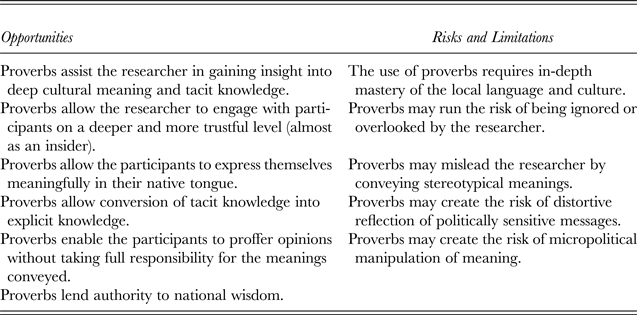
Because proverbs are inherited from generation to generation (Hristztova-Gotthardt & Varga, Reference Hristztova-Gotthardt and Varga2014), they capture the cultural, historical, and institutional characteristics of a nation from the local perspective. Hence, proverbs provide the researcher with the opportunity to gain insight into deep-rooted cultural meaning and to engage with participants in a more trustful way. As Table 3 shows, proverbs are like slogans that allow research participants to communicate rich meanings concisely. Participants may also signal group membership or national identification, reinforce their own arguments, or add authority and credibility to their utterances by identifying with traditional wisdom and beliefs. Similarly, proverbs provide the opportunity to avoid taking personal responsibility for the meanings conveyed (Norrick, Reference Norrick1985). Proverbs can also be used to convert tacit knowledge into explicit knowledge. Like metaphors, they are a way ‘to express the inexpressible’ (Nonaka, Reference Nonaka1991: 99).
However, in order to appreciate proverbs in fieldwork, non-native researchers should have an in-depth mastery of the local language and culture (Michailova, Reference Michailova, Marschan-Piekkari and Welch2004; Xian, Reference Xian2008), when conducting research in emerging market contexts. Otherwise proverbs may run the risk of being ignored or overlooked in the data. On the other hand, native researchers may take proverbs for granted and pay no heed to them. Table 3 suggests that proverbs can also be used for political purposes and their meaning can be manipulated. In the Soviet era, several thousand proverbs were created for educational purposes and used in visual propaganda. They were published in anthologies of Russian proverbs, in almanacs, and in school textbooks (Chlebda, Reference Chlebda1997). The collection of Soviet proverbs covered three major aspects of life in the Soviet Union: Soviet power and the Soviet motherland (‘Maria used to live as a slave, and now she is a deputy in the Supreme Soviet’; ‘рабой жила Мария на свете, а сейчас депутат на Верховном Совете’), defending Soviet power and the motherland (‘A Soviet soldier can even fight alone on the battlefield’; ‘Советский боец и один в поле воин’), and the heroic efforts of the Soviet people during times of peace (‘If you like to get bonuses, you have to like to do more than was planned’; ‘любишь премироваться, люби и план перевыполнять’). As these examples show, Soviet proverbs rejected and criticized the old ways of life (Reznikov, Reference Reznikov2009). A final limitation of using proverbs is that they may mislead the researcher by conveying superficial, stereotypical meaning. In international encounters, speakers often resort to oversimplified and fixed stereotypes in constructing themselves and ‘the other’ (Koveshnikov, Vaara, & Ernhrooth, Reference Koveshnikov, Vaara and Ehrnrooth2016). Hence, researchers who are experts in the study of proverbs recommend using multiple data sources when drawing conclusions about national characteristics (Mieder, Reference Mieder2008).
An important conceptual implication of our research is that discursive voids enable discovery of the diverse meanings that management concepts and practices carry in emerging markets. Instead of imposing existing Western concepts and a pre-defined terminology on research participants, researchers can gain new insight by engaging participants in explaining their own sensemaking processes. In this way, it is possible to surface alternative, context-specific meanings of management concepts such as empowerment.
Limitations and Future Research Directions
Although in the present study we only explored the use of proverbs in one context – Russia – proverbs can also serve as a methodological resource in other language environments. For example, proverbs are often used in China to signal the speaker's high level of education and experience (Fiedler, Reference Fiedler, Hristztova-Gotthardt and Varga2014), providing valuable information about Chinese cultural and institutional features. In her reflexive account, Xian (Reference Xian2008) vividly describes the challenges that she encountered when attempting to translate Chinese idioms and proverbs. As linguistic resources they included unique Chinese names and locations, which were meaningless in English. In another study, Weber, Hsee, and Sokolowska (Reference Weber, Hsee and Sokolowska1998) explored proverbs to assess risk-taking among Chinese, American, and German students. A few studies have also addressed the possibility of using proverbs as a means of teaching cultural dimensions (Sronce & Li, Reference Sronce and Li2011; Witte & Daly, Reference Witte and Daly2014). A context outside emerging markets is Japan, where proverbs and metaphors are also used. Pascale (Reference Pascale1978) relied on them as discursive resources to articulate the subtleties and nuances of Japanese management, because he found traditional management vocabulary insufficient for his purposes.
Our study focused on the process of making sense and negotiating shared meaning to bridge a discursive void rather than on the process of creating new lived meanings and words over time. In the field of translation studies, scholars observe that when new concepts are introduced to a language or culture, terms and expressions that did not exist previously may eventually be needed (Pym, Reference Pym2014). Future research could adopt an interdisciplinary approach by drawing on contributions to translation studies to uncover the creation of new management terminology in emerging markets. Furthermore, while we limited our study to the use of proverbs in interview settings, another avenue would be to conduct ethnographic research on how employees use proverbs at the workplace in naturally occurring everyday talk or how proverbs are used in management texts. We acknowledge that proverbs represent only one strategy for bridging discursive voids and future research could explore antonyms, synonyms, jargon, and other discursive resources to discover new views and dimensions of established concepts. Finally, we approached language differences primarily as a methodological issue. However, there is an emerging stream of research that sees languages from a more philosophical, almost meta-theoretical perspective in terms of how epistemic communities produce knowledge (e.g., Steyaert & Janssens, Reference Steyaert and Janssens2012; Tietze, Reference Tietze2018).
CONCLUSION
In this article, we show how discursive voids, which are common in emerging market contexts, can be addressed when the research participants and the researcher are prepared to use creative strategies. The practical lessons we learnt from engaging in qualitative research in emerging markets point to the use of a combination of strategies such as the dual role of researcher-translator, a contextual and sensitive approach to data, consulting of external interpreters, as well as a flexible and iterative research approach to bridge discursive voids. We also found that creating open and trustful relationships with research participants may encourage them to use vivid expressions such as proverbs, bringing rich and context-sensitive insight on the researched phenomenon to the fore. Thus, we join the growing number of qualitative researchers who argue for the importance of context and contextualization in theorizing about IB phenomena (Meyer, Reference Meyer2015; Michailova, Reference Michailova, Marschan-Piekkari and Welch2004, Reference Michailova2011; Tsui, Reference Tsui2006).
On a more fundamental level, we learnt that the discursive void identified in this study stemmed from the cultural incompatibility of the concept of empowerment with the Russian meaning system. This has important implications for research on emerging markets. While previous literature has discussed at length how Western management concepts should be adapted to emerging markets (Barkema, Chen, George, Luo, & Tsui, Reference Barkema, Chen, George, Luo and Tsui2015; Tsui, Reference Tsui2004) and translated correctly (Temple & Young, Reference Temple and Young2004), our study points to deep-seated challenges associated with the explanatory mechanisms of the theories themselves. The notion of discursive void reveals the difficulties of establishing equivalence of meaning across borders and assuring the validity of core concepts, but also the possibilities to debate meanings and taken-for-granted assumptions of pre-specified words and categories that scientific communities depend on. An established terminology, we would argue, tends to cement particular meanings, assume mutual understanding and even prevent researchers from seeing or hearing alternative interpretations in cross-language research. In this article, we have highlighted the importance of studying contextual differences and their micro-foundations at the level of language and meaning systems. We believe this approach offers a fruitful avenue for international business scholars to meaningfully advance knowledge on emerging markets.

